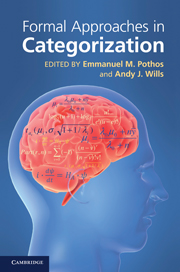Book contents
- Frontmatter
- Contents
- List of figures
- List of tables
- List of contributors
- 1 Introduction
- 2 The generalized context model: an exemplar model of classification
- 3 Prototype models of categorization: basic formulation, predictions, and limitations
- 4 COVIS
- 5 Semantics without categorization
- 6 Models of attentional learning
- 7 An elemental model of associative learning and memory
- 8 Nonparametric Bayesian models of categorization
- 9 The simplicity model of unsupervised categorization
- 10 Adaptive clustering models of categorization
- 11 Cobweb Models of Categorization and Probabilistic Concept Formation
- 12 The knowledge and resonance (KRES) model of category learning
- 13 The contribution (and drawbacks) of models to the study of concepts
- 14 Formal models of categorization: insights from cognitive neuroscience
- 15 Comments on models and categorization theories: the razor's edge
- Index
- References
15 - Comments on models and categorization theories: the razor's edge
Published online by Cambridge University Press: 05 June 2012
- Frontmatter
- Contents
- List of figures
- List of tables
- List of contributors
- 1 Introduction
- 2 The generalized context model: an exemplar model of classification
- 3 Prototype models of categorization: basic formulation, predictions, and limitations
- 4 COVIS
- 5 Semantics without categorization
- 6 Models of attentional learning
- 7 An elemental model of associative learning and memory
- 8 Nonparametric Bayesian models of categorization
- 9 The simplicity model of unsupervised categorization
- 10 Adaptive clustering models of categorization
- 11 Cobweb Models of Categorization and Probabilistic Concept Formation
- 12 The knowledge and resonance (KRES) model of category learning
- 13 The contribution (and drawbacks) of models to the study of concepts
- 14 Formal models of categorization: insights from cognitive neuroscience
- 15 Comments on models and categorization theories: the razor's edge
- Index
- References
Summary
If I may make a personal remark, one sign of old age is that people ask you to write commentaries on new(er) work. In the present case the invitation for me to write something may be linked to the publication of the Medin and Schaffer (1978) context theory of categorization model more than 30 years ago and/or the Smith and Medin (1981), Categories and Concepts book, almost as old. This ought to provide enough distance to view cumulative progress in this area of research and theory. Of course there was more than a little earlier work by Posner and Keele (1968), Reed (1973), and Smith, Shoben and Rips (1974) relevant to models and by Rosch, Mervis and others (e.g. Rosch, 1973, 1975; Rosch & Mervis, 1975; Rosch et al., 1976) laying out basic levels and goodness of example or typicality effects that reverberated through the cognitive sciences. The basic levels work was so important that it now has the status of being presupposed in developmental studies on the interaction of language and conceptual development (e.g., Waxman, 1989, 2002; Waxman & Lidz, 2006).
One way of assessing progress in an area is to evaluate how it is doing with respect to narrowness and insularity versus breadth. Cutting edge research seems like something that is inherently good, but it may be useful to examine what is being cut and how that edge is related to broader configurations.
Information
- Type
- Chapter
- Information
- Formal Approaches in Categorization , pp. 325 - 331Publisher: Cambridge University PressPrint publication year: 2011
